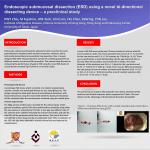Philip Chiu, MD, Mitsuhiro Fujishiro, MD, PhD, Anthony Y Teoh, FRCSEd, Cch Lam, RN, Fkl Chan, MD, Ekw Ng, MD, Jyw Lau, MD
Institute of Digestive Disease, Chinese University of Hong Kong, Hong Kong and Endoscopy Center, University of Tokyo, Japan
Introduction
Endoscopic submucosal dissection achieved en-bloc resection for early gastrointestinal neoplasia with excellent outcomes. However, ESD is technically demanding and necessitate long operative time. A newly designed ESD knife incorporated the concept of combining properties of different devices to enhance ESD procedure. This animal study focused on comparing the performance of gastric ESD using the novel ESD device to conventional Insulated Tip (IT) knife in an animal model.
Method
A prototype ESD device which consisted of a mobile insulated polo outside a needle was developed (Pentax Co Ltd, Japan)(Figure 1). The design intended to allow both forward and backward dissection, with forward dissection using the end-needle while the backward dissection will be achieved when the end becomes insulated using the mobile polo. Ten 30kg porcine models were recruited for the animal study. Under general anesthesia, gastric ESD were performed by randomly using either the new device or conventional IT knife. In one pig, two different site of the stomach were selected including the antrum and cardia, and side-by-side ESD will be performed with these two knives. The size of the lesion was defined as 3cm measured by an endoscopic ruler. After completion of the ESD, the pigs were allowed to resume normal diet and observe for complications.
Results
A total of 40 ESD were performed, 20 were located at antrum while 20 were located at cardia. The mean operative time was 15.0 +/- 7.5 minutes for the new device and 11.3 +/- 6.6 minutes for IT knife (p = 0.11). There was no perforation or post ESD bleeding. All the pigs tolerated diet on first day after the procedure and survived for 2 weeks. The mean diameter of the specimen was 31.6 +/- 5.6mm for the new device and 32.75 +/- 7.8mm for IT knife (p = 0.61). There was no difference between the two groups in term of volume of submucosal injection (19.9 +/-11.5 vs 18.4 +/- 9.2 ml; p = 0.63) and surface area of resected specimen (8.6 +/-2.9 vs 9.3 +/-4.5 cm2; p = 0.52).
Conclusions
The performance of gastric ESD using this new device achieved similar technical and clinical outcomes when compared to IT knife. This new device has the advantage of bi-directional dissection during ESD.
Session: Poster Presentation
Program Number: P667


